

Parent-Teacher Meetings (PTMs) are crucial milestones in a child’s educational journey. As parents, we understand that our active involvement in our child’s education can make a significant difference in their growth and development. PTMs provide a unique opportunity to gain insights into our child’s progress, strengths, and areas that may need attention. In this comprehensive guide, we will delve into the importance of PTM as a parent and explore the essential questions to ask during these meetings, emphasizing the focus keyword “PTM as a parent.”
Parent-Teacher Meetings serve as a bridge between home and school. They allow parents and teachers to collaborate, share information, and collectively work towards the well-being and academic success of the child. PTMs create an open and supportive environment where parents can address concerns, seek guidance, and gain a deeper understanding of their child’s educational experience.
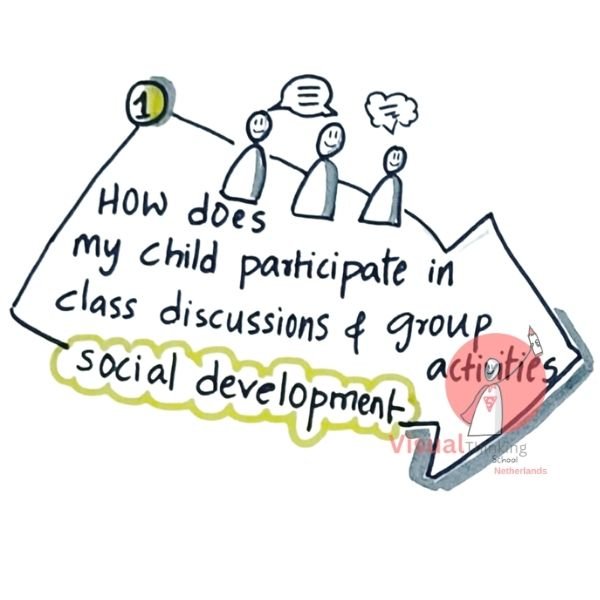
Social development is a crucial aspect of a child’s growth. As a parent attending a PTM, you can begin by asking about your child’s interactions in the classroom. How does your child participate in class discussions and group activities? This question delves into your child’s ability to engage with peers, express their thoughts, and collaborate effectively. It can provide insights into their social skills and confidence.
Inquiring about your child’s social interactions can also reveal any potential issues related to shyness, social anxiety, or difficulty in working with others. By discussing these concerns with the teacher, you can collectively develop strategies to help your child improve their social skills and feel more comfortable in group settings.
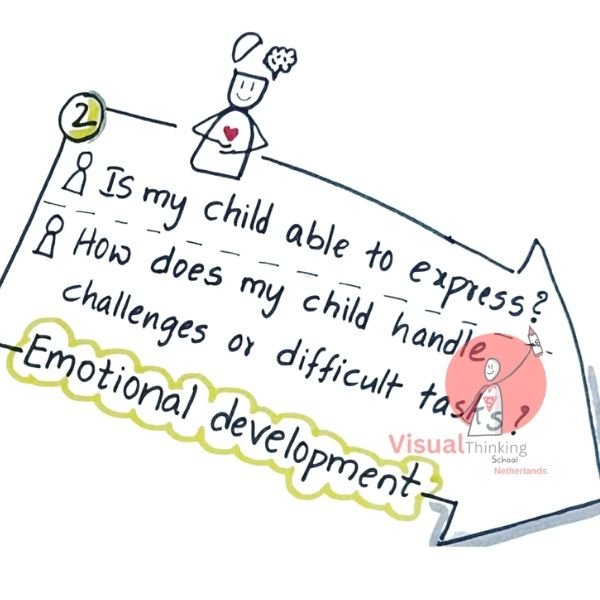
Emotional development is closely intertwined with a child’s overall well-being. During the PTM, it’s essential to ask about your child’s emotional growth. Inquire whether your child can express their feelings effectively. Understanding how your child manages their emotions, especially during challenging tasks, is valuable information.
By discussing emotional development, you can gain insights into how your child copes with stress, frustration, and setbacks. Teachers can provide guidance on how to support your child’s emotional growth at home, such as teaching them healthy ways to handle difficulties and offering a nurturing environment to express their emotions freely.
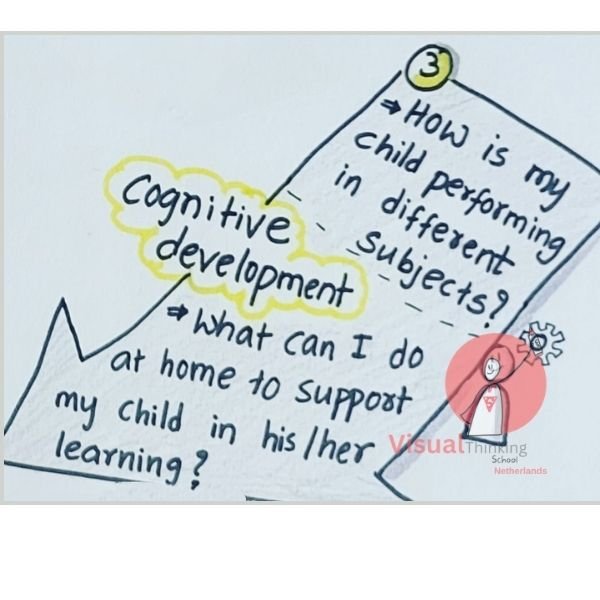
Cognitive development is at the core of education. During a PTM, inquire about your child’s academic performance in different subjects. Are there subjects where they excel, and are there areas where they may need additional support or enrichment? Understanding your child’s strengths and weaknesses academically is essential for tailoring your support at home.
Additionally, ask the teacher for recommendations on how you can actively participate in your child’s learning journey. This may include suggestions for creating a conducive study environment at home, providing additional resources, or engaging in educational activities that align with classroom learning.
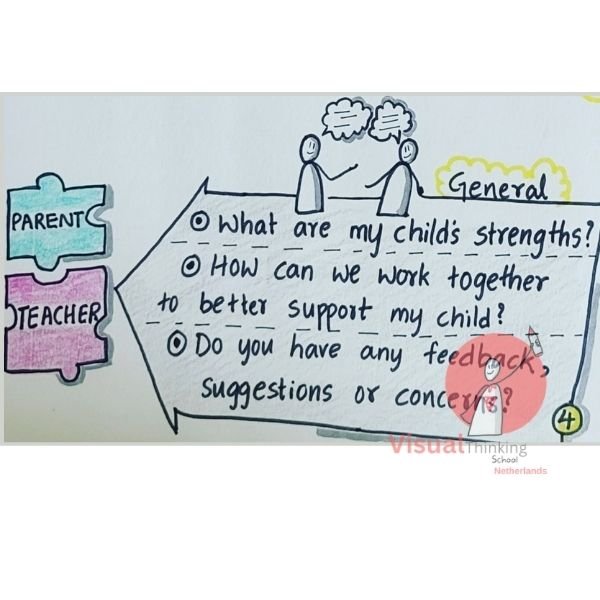
Every child possesses unique strengths that should be identified and nurtured. Ask the teacher to highlight your child’s strengths in various aspects of their education, whether it’s a particular talent, skill, or aptitude. Understanding these strengths can help you encourage and develop them further, fostering a sense of self-confidence and accomplishment in your child.
Collaboration between parents and teachers is paramount to a child’s success. Use the PTM as an opportunity to discuss how you can work together to provide the best support for your child. Ask the teacher about specific areas where your involvement can make a difference, whether it’s monitoring homework, reinforcing specific skills, or promoting a love for reading.
Furthermore, inquire if the teacher has any feedback, suggestions, or concerns regarding your child’s progress. Teachers may offer valuable insights into areas where your child might need additional assistance or guidance.
The journey of parenthood is a remarkable one, filled with moments of joy, challenges, and learning. In this journey, active parental involvement can significantly impact a child’s development and overall well-being. PTMs exemplify this involvement, showcasing the importance of parents and teachers working hand in hand to nurture young minds.
As a parent, your presence at PTMs sends a powerful message to your child—that you are deeply invested in their education and future. This involvement serves as a role model for them, demonstrating the value of taking responsibility for one’s learning and progress. When children witness their parents actively engaging with teachers and showing genuine interest in their school experiences, it fosters a sense of motivation and responsibility within them.
Moreover, PTMs provide a unique opportunity for parents to connect with teachers on a personal level. By establishing a strong rapport with your child’s educators, you create an environment where open communication thrives. This trust-based relationship allows for the sharing of valuable insights, concerns, and recommendations that can significantly impact your child’s educational journey.
Beyond the questions outlined earlier, PTMs allow parents to empower their children by addressing challenges and celebrating successes together. If your child is facing difficulties in certain subjects or areas of development, PTMs provide a platform to collaboratively devise strategies for improvement. Teachers can offer valuable guidance and resources to support your child’s growth.
On the flip side, PTMs are also an opportunity to acknowledge and celebrate your child’s achievements and progress. Recognizing their efforts and strengths can boost their self-esteem and motivation to excel further. The positive reinforcement provided by parents and teachers can serve as a driving force for your child to overcome obstacles and reach their full potential.
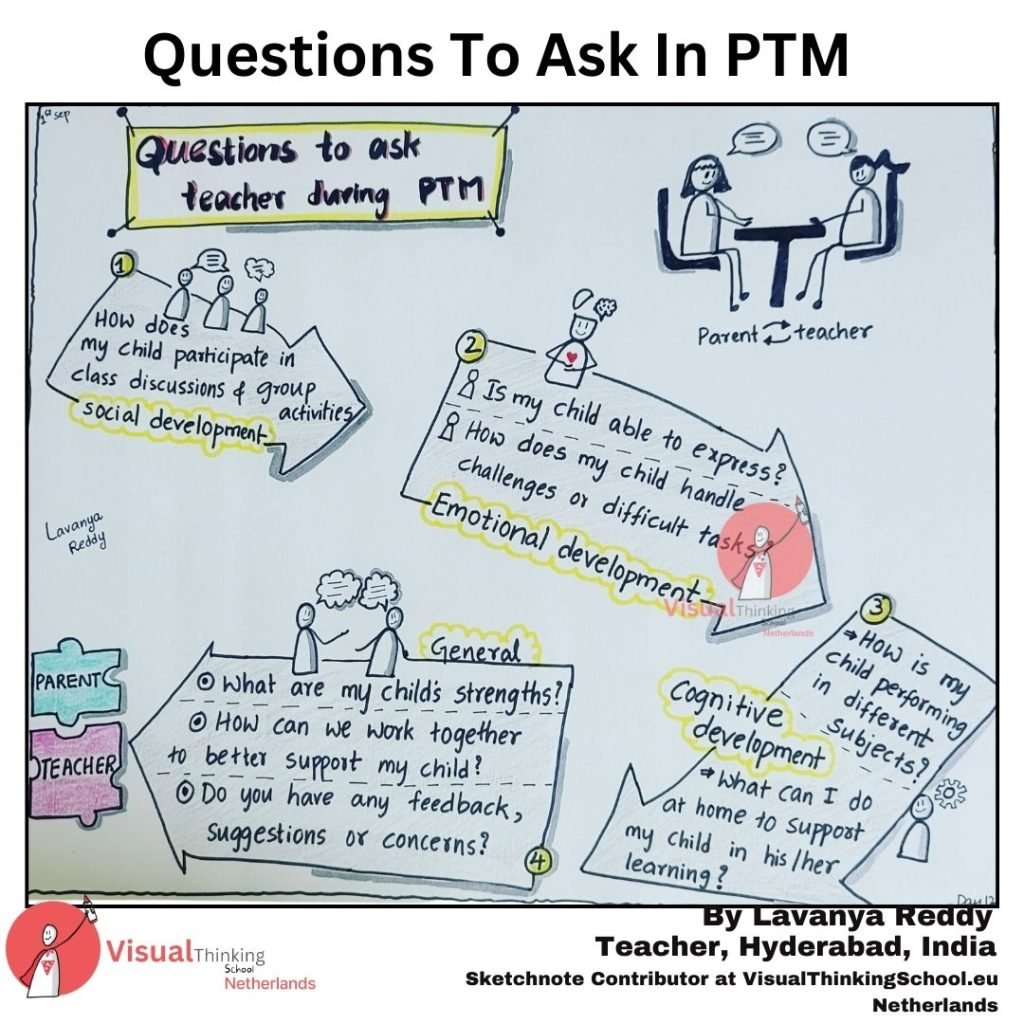
In conclusion, Parent-Teacher Meetings are not mere formalities; they are powerful gatherings that have the potential to shape a child’s educational journey profoundly. By actively participating in PTMs and asking the right questions, you demonstrate your commitment to your child’s development. You also contribute to creating a supportive, collaborative environment that empowers your child to thrive academically and emotionally.
PTM as a parent is more than just a meeting; it’s an opportunity to strengthen the bonds between home and school, fostering an environment where your child can flourish. So, as you prepare for your next PTM, approach it with enthusiasm and dedication, knowing that your active involvement is an invaluable resource in guiding your child towards a bright and successful future.
We conduct online and in-person certification trainings on our Trade Marked Training on Business Sketchnotes ™.
We have an open challenge in our trainings : If you can not draw after our 9 hours of trainings, we will close our trainings FOR EVER !! ..and we are still waiting for that one person even after training more than 38000 professionals.
You can also join our whatsapp community to learn from those who have attended our trainings

We trained more than 38000 professional and gave corporate trainings in more than 65+ top notch companies

Check Our Trainings

Maths educator by profession and sketchnoter by passion. She loves teaching maths using sketchnotes. She is also an acredited school sketchnote trainer with Visual Thinking School, Netherlands.
More of her sketchnotes can be checked on her Instagram: @Lavanya_anugula